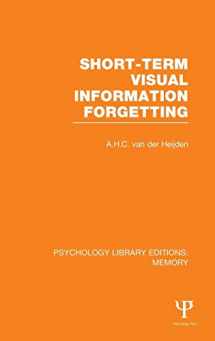
Short-term Visual Information Forgetting (PLE: Memory) (Psychology Library Editions: Memory)
Book details
Summary
Description
When this title was originally published in 1981, the information processing approach to perception and memory was dominant in experimental psychology, and the research reported here had major implications for future development. After exploring the shortcomings of earlier work in this field, the author develops a new model which he shows to be capable of accounting for a variety of experimental data connected with human information processing, visual perception and attention.
The central theme which is discussed is how we select relevant and discard irrelevant information. The basic assumption is that all incoming information is identified, that is, it reaches and activates the appropriate lexical entries. A piece of identified information is described as a unit consisting of three distinguishable codes: a visual code, a lexical or semantic code and a motor or action code. Identified information decays fast, so selective attention operates by selecting those units which have to be saved from this rapid decay. In a sense, therefore, the human information processor is described as struggling against forgetting.


We would LOVE it if you could help us and other readers by reviewing the book
Book review



